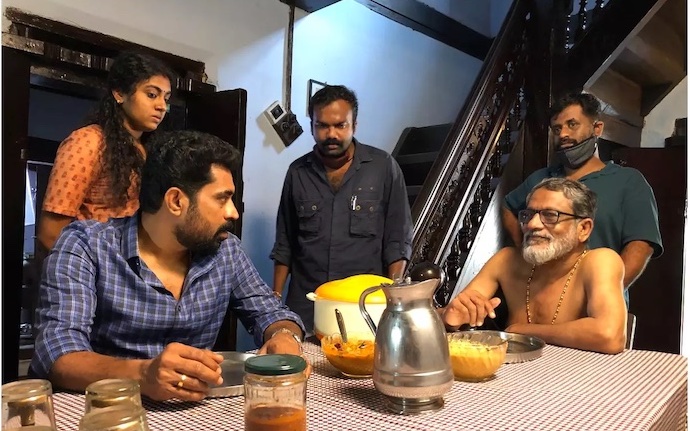Every woman, who has slaved in the kitchen like her grandmother and great grandmother before her, nurturing her family with the hard labor of her cooking and care, day after day, year after ceaseless year needs to watch Jeo Baby’s The Great Indian Kitchen. This film makes dry statistics leap out of the screen. A 2020 Gallup poll found that women still did a majority of household chores in the USA, which is supposed to be a bastion of gender equality.
If American women can’t get their partners to share in mundane chores at home, what chance do Indian women have in traditional settings?
The Great Indian Kitchen addresses the subtleties of gender inequality with a strong feminist message; but it’s less about flashy, strident feminist rebellion in short skirts, and more about the nuances of self-respect shredding and sweaty, grueling hours of labor being taken for granted, simply because you’re female.
The film is in Malayalam and I don’t speak the language, but that didn’t detract from the essence and great acting. It didn’t reduce the subtlety and realism of the emotions as a young Malayalee girl with a fierce independent streak, grapples with the reality of an arranged marriage into a conservative family.
Nimisha Sajayan plays the new bride. She is a typical middle-class girl in Kerala raised in a relatively liberal household. She blooms with happiness when her marriage is arranged to the young groom (Suraj Vengaramoodu.) Nimisha is attracted to this stranger who will be her husband. He is soft-spoken, as is the rest of his family, and Nimisha is eager to please her new in-laws in the way many Indian women are conditioned to.
She doesn’t mind the weight of household chores expected of her almost immediately. The movie creates a clever, visual impact, scene after scene, of a loaded, dripping kitchen sink, constant washing and cleaning up of messes that men in the family left behind, and of Nimisha sweating over a stove, making endless cups of tea for her husband and father-in-law.
In the beginning, Nimisha’s mother-in-law helps with the daily drudgery, but when she goes away to her daughter, the household burdens fall on Nimisha.

A major strength of the plot’s message is the lack of drama.
Nimisha isn’t abused – she is cajoled and shamed when she doesn’t live up to her in-law’s narrow, self-serving expectations. Her new husband takes her for granted and isn’t sensitive to her burden.
Innumerable Indian women will identify with the slow stoking of Nimisha’s rage as she is manipulated and sometimes overtly humiliated in a way that is considered socially acceptable. In one scene, a cousin who is visiting her in-laws with his wife tells Nimisha off for giving him black tea without cardamom or spices. He lectures her on the recipe, puts his wife down when she attempts a feeble defense of Nimisha’s tea-making skills and offers to have the men take over the kitchen for cooking duties that day.
Switch to scene two – the men have cooked and eaten but left dirty plates on the table for Nimisha to clear. The kitchen is a disaster of dirty pots and spilled food, doubling the work for Nimisha. When she finally brings tea for the men and excuses herself to go clean the kitchen, the cousin laughs and says, “What work, we did the cooking today!” Scenes like these, of ordinary, everyday insensitivity with which female audiences will immediately identify, are the reason the Great Indian Kitchen has a four-star rating.
In a nod to the Indian Supreme Court’s 2018 decision to strike down the Sabarimala temple edict (which banned women of menstruating age on their premises), the film also takes on traditional superstitious rituals – like the banishment of women from the kitchen during their periods. Nimisha has to shut herself in a little room when she has her period and suffers the humiliation of being treated like a leper. As events pile up, and the grueling hamster wheel of daily household chores continues unabated, the movie speeds toward its climax.
The end is inevitable, and when it comes, there is shock and catharsis and a wise nodding of heads. The irony at the end is a perfect coda to Nimisha’s saga.
The Great Indian Kitchen is available to stream on Neestream.
Jyoti Minocha is a DC-based educator and writer who holds a Masters in Creative Writing from Johns Hopkins, and is working on a novel about the Partition.
Edited by Meera Kymal, Contributing Editor at India Currents.


